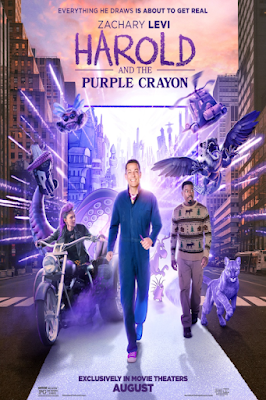Harold and the Purple Crayon is a very popular illustrated children's book in America. Despite not being very familiar with the story, I thought the trailer for this looked interesting. And with Zachary Levi in the title role, it felt worth a look.
The story starts with Harold and his friends, in their illustrated form, having various adventures with the magic purple crayon. Anything drawn using the crayon takes form, whether that's a dragon, a moose, a porcupine, a boat, or whatever.
Harold and his friends are used to listening to the "narrator" and when the narrator stops answering their questions, Harold draws a way into the "real world" to try and find him. Mayhem ensues as Harold uses the creative power of his purple crayon to help people, although his good intentions cause chaos.
I won't relate the entire story, but basically there are people who realise the power of the crayon and use it for their own ends, but it all works out in the long run. Zooey Deschanel plays the other lead role opposite Levi and there is able support from Lil Rey Howery (who I last saw as Buddy in Free Guy) as Moose, Tanya Reynolds as Porcupine, Benjamin Bottani as Harold's first friend in the real world, and Jermaine Clement (from Flight of the Conchords) who plays a great hammy villain. The script is quite tight - I laughed several times - and the runtime of 90 minutes is just the right length.
Apparently the reviews haven't been kind to the film, but what do film critics know, really? I went in with fairly low expectations and was pleasantly surprised. And there was one element of the film that went a bit deeper than I expected.
Harold has entered the real world looking for the 'old man', the narrator. This is a mix of father figure and creator, who has suddenly gone silent. As he becomes aware of who the 'narrator' was - the author of the book, the late Crockett Johnson - he realises that from now on he won't have a narrator for his adventures. This places him in existential crisis - asking the big questions of what does he do with his life now?
In one sense this is a way of looking at parental bereavement. The gap left by a now absent parent. But, for me, it felt there was a wider parallel of any occasion where we are feel that things we were certain about are no longer certain and the need to find a way through - that suddenly we are the narrators of our own stories, the creators of our own worlds and we can't rely on there being a voice from the sky telling us what to do next.
Harold's response when he gets a final message from the author, telling him to take his destiny into his own hands is to be grateful for the opportunity and to see it as an adventure. It is refreshing to watch a movie with such an uplifting and life-affirming conclusion.

No comments:
Post a Comment